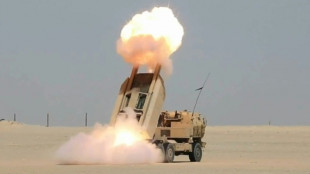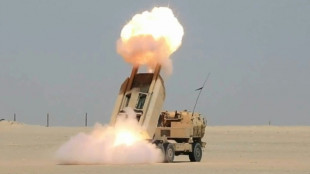
-
 Trump fires homeland security chief Kristi Noem
Trump fires homeland security chief Kristi Noem
-
Mideast war risks pulling more in as conflict boils over

-
 Wales' James Botham 'sledged' by grandfather Ian Botham after Six Nations error
Wales' James Botham 'sledged' by grandfather Ian Botham after Six Nations error
-
India hero Samson eyes 'one more' big knock in T20 World Cup final

-
 Britney Spears detained on suspicion of driving while intoxicated
Britney Spears detained on suspicion of driving while intoxicated
-
Grooming makes Crufts debut as UK dog show widens offer

-
 Townsend insists Scots' focus solely on France not Six Nations title race
Townsend insists Scots' focus solely on France not Six Nations title race
-
UK sends more fighter jets to Gulf: PM

-
 EU to ban plant-based 'bacon' but veggie 'burgers' survive chop
EU to ban plant-based 'bacon' but veggie 'burgers' survive chop
-
Leagues Cup to hold matches in Mexico for first time

-
 India reach T20 World Cup final after England fail in epic chase
India reach T20 World Cup final after England fail in epic chase
-
Conservative Anglicans press opposition to Church's first woman leader

-
 Sri Lanka takes control of Iranian ship fearing new US sub attack
Sri Lanka takes control of Iranian ship fearing new US sub attack
-
Iran players sing anthem and salute at Women's Asian Cup

-
 India beat England in high-scoring T20 World Cup semi-final
India beat England in high-scoring T20 World Cup semi-final
-
Mideast war traps 20,000 seafarers, 15,000 cruise passengers in Gulf

-
 Italy bring back Brex to face England
Italy bring back Brex to face England
-
French policeman to be tried over 2023 killing of teen

-
 More flights take off despite continued fighting in Middle East
More flights take off despite continued fighting in Middle East
-
Ukraine, Russia free 200 POWs each

-
 Middle East war halts work at WHO's Dubai emergency hub
Middle East war halts work at WHO's Dubai emergency hub
-
Paramount's Ellison vows CNN editorial independence

-
 US says attacks on alleged drug boats have spooked traffickers
US says attacks on alleged drug boats have spooked traffickers
-
Dempsey returns as Scotland shuffle pack for Six Nations clash against France

-
 India pile up 253-7 against England in T20 World Cup semi-final
India pile up 253-7 against England in T20 World Cup semi-final
-
Wary Europeans pledge 'defensive' military aid in Mideast war

-
 Oil prices rise, stocks drop as Middle East war stirs supply concerns
Oil prices rise, stocks drop as Middle East war stirs supply concerns
-
Seven countries to boycott Paralympics ceremony over Russia: organisers

-
 UK's Crufts dog show opens with growing global appeal
UK's Crufts dog show opens with growing global appeal
-
PSG prepare for Chelsea clash with Monaco rematch

-
 Google opens AI centre as Berlin defends US tech reliance
Google opens AI centre as Berlin defends US tech reliance
-
Second Iranian ship nears Sri Lanka after submarine attack

-
 Portugal mourns acclaimed writer Antonio Lobo Antunes
Portugal mourns acclaimed writer Antonio Lobo Antunes
-
Union loses fight against Tesla at German factory

-
 Wales revel in being the underdogs, says skipper Lake
Wales revel in being the underdogs, says skipper Lake
-
German school students rally against army recruitment drive

-
 Wary European states pledge military aid for Cyprus, Gulf
Wary European states pledge military aid for Cyprus, Gulf
-
Liverpool injuries frustrating Slot in tough season

-
 Real Madrid will 'keep fighting' in title race, vows Arbeloa
Real Madrid will 'keep fighting' in title race, vows Arbeloa
-
Australia join South Korea in quarters of Women's Asian Cup

-
 Stocks, oil climb as Middle East war stirs volatility
Stocks, oil climb as Middle East war stirs volatility
-
Kane to miss Bayern game against Gladbach with calf knock

-
 Henman says Raducanu needs more physicality to rise up rankings
Henman says Raducanu needs more physicality to rise up rankings
-
France recall fit-again Jalibert to face Scotland

-
 Harry Styles fans head in one direction: to star's home village
Harry Styles fans head in one direction: to star's home village
-
Syrian jailed over stabbing at Berlin Holocaust memorial

-
 Second Iranian ship heading to Sri Lanka after submarine attack
Second Iranian ship heading to Sri Lanka after submarine attack
-
Middle East war spirals as Iran hits Kurds in Iraq

-
 Norris hungrier than ever to defend Formula One world title
Norris hungrier than ever to defend Formula One world title
-
Fatherhood, sleep, T20 World Cup final: Henry's whirlwind journey


DeepSeek breakthrough raises AI energy questions
Having shattered assumptions in the tech sector and beyond about the cost of artificial intelligence, Chinese startup DeepSeek's new chatbot is now roiling another industry: energy companies.
The firm says it developed its open-source R1 model using around 2,000 Nvidia chips, just a fraction of the computing power generally thought necessary to train similar programmes.
That has significant implications not only for the cost of developing AI, but also the energy for the data centres that are the beating heart of the growing industry.
The AI revolution has come with assumptions that computing and energy needs will grow exponentially, resulting in massive tech investments in both data centres and the means to power them, bolstering energy stocks.
Data centres house the high-performance servers and other hardware that make AI applications work.
So might DeepSeek represent a less power-hungry way to advance AI?
Investors seemed to think so, fleeing positions in US energy companies on Monday and helping drag down stock markets already battered by mass dumping of tech shares.
Constellation Energy, which is planning to build significant energy capacity for AI, sank more than 20 percent.
"R1 illustrates the threat that computing efficiency gains pose to power generators," wrote Travis Miller, a strategist covering energy and utilities for financial services firm Morningstar.
"We still believe data centers, reshoring, and the electrification theme will remain a tailwind," he added.
But "market expectations went too far."
- Nuclear ambitions -
In 2023 alone, Google, Microsoft and Amazon ploughed the equivalent of 0.5 percent of US GDP into data centres, according to the International Energy Agency (IEA).
Data centres already account for around one percent of global electricity use, and a similar amount of energy-related greenhouse gas emissions, the IEA says.
Efficiency improvements have so far moderated consumption despite growth in data centre demand.
But the IEA projects global electricity use by data centres could double from 2022 figures by next year, to around Japan's annual consumption.
That growing demand is unevenly spread.
Data centres accounted for about 4.4 percent of US electricity consumption in 2023, a figure that could reach up to 12 percent by 2028, according to a report commissioned by the US Department of Energy.
Last year, Amazon, Google and Microsoft all made deals for nuclear energy, either from so-called Small Modular Reactors or existing facilities.
Meta meanwhile has signed contracts for renewable energy and announced it is seeking proposals for nuclear energy supplies.
For now though, data centres generally rely on electricity grids that are often heavily dependent on fossil fuels.
- 'Jevons paradox strikes again!' -
Data centres also suck up significant amounts of water, both indirectly due to the water involved in electricity generation, and directly for use in cooling systems.
"Building data centres requires lots of carbon in the production of steel and also lots of carbon-intensive mining and production processes for creating the computing hardware to fill them," said Andrew Lensen, senior lecturer in artificial intelligence at Victoria University of Wellington.
"So if DeepSeek was to replace models like OpenAI's... there would be a net decrease in energy requirements."
However, increasing efficiency in technology often simply results in increased demand -- a proposition known as the Jevons paradox.
"Jevons paradox strikes again!" Microsoft CEO Satya Nadella wrote on X on Monday.
"As AI gets more efficient and accessible, we will see its use skyrocket, turning it into a commodity we just can't get enough of," he added.
Lensen also pointed out that DeepSeek uses a "chain-of-thought" model that is more energy-intensive than alternatives because it uses multiple steps to answer a query.
These were previously too expensive to run, but could now become more popular because of efficiencies.
Lensen said DeepSeek's impact might be to help US companies learn "how they can use the computational efficiencies to build even larger and more performant models".
"Instead of making their model 10 times smaller and efficient with the same level of performance, I think they'll use the new findings to make their model more capable at the same energy usage."
F.Dubois--AMWN


